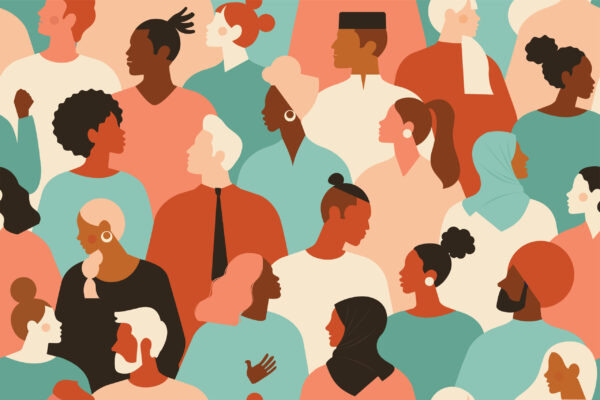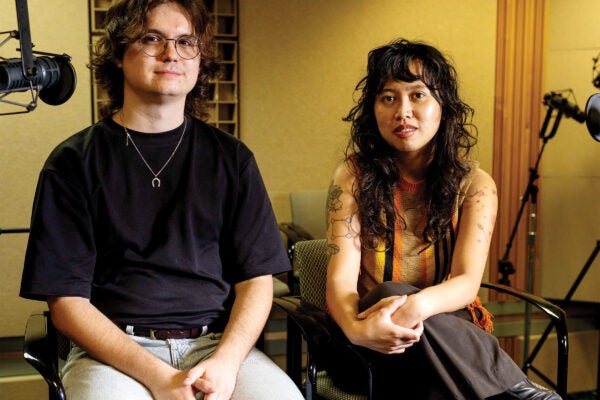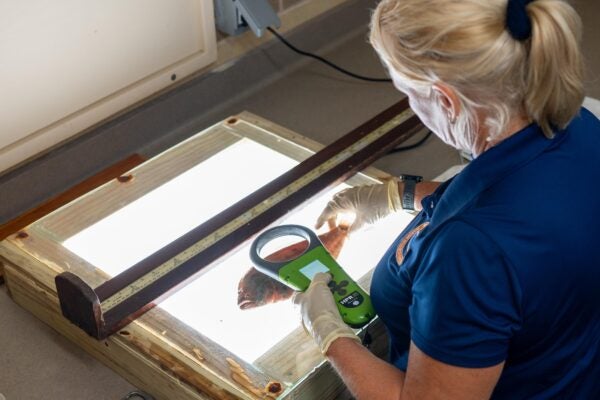In a place as large as The University of Texas at Austin, it can be challenging to get to know people outside our immediate departments, schools and colleges — and that’s even before the mostly remote environment so many experienced during the COVID-19 pandemic. University Resource Groups offer all staff and faculty members a way to find community and connection. URGs “celebrate the voices, identities, experiences and talents” of specific communities and are open to all staff and faculty members. They also offer professional development opportunities, social events and community service options.
PEFSA
The Pride and Equity Faculty Staff Association was established in fall 2006 to promote the interests of LGBTQ+ and allied faculty and staff at UT Austin, says Liz Elsen, the director of the Gender and Sexuality Center.
At the time of publication, PEFSA was still planning fall events. Previous events include UT Austin Lavender Graduation, a joint panel with the Black Faculty and Staff Association on “Supporting Black LGBTQIA+ People in the Classroom, the Workplace and the Community,” a gender-inclusive clothing swap and more.
“PEFSA has been an important part of my time at UT and has led me to some of my closest friendships and best memories of campus,” Elsen says. “I’ve always loved the events that we have done with other University Resource Groups, from our annual all- URG potluck, to the events where we provide resources about how to be in solidarity with each other as underrepresented populations on campus. There is so much to learn and so many amazing people to meet.”
Find out more: linktr.ee/PEFSA
HFSA
The Hispanic Faculty Staff Association was formed in 1991. Robert Valdez, staff co-chair elect for HFSA, says community is a big part of what the group does on campus.
“It’s the familia, the bringing together of all faculty and staff to come to one place for a common meeting for the Latinx community and the marginalized communities on campus,” Valdez says.
In addition to regular meetings and social functions, HFSA sponsors the annual John Treviño Jr. Holiday Assistance Program, which provides holiday meal assistance to staff members in need. It’s one of two major giving initiatives for HFSA.
“A big function of our organization is to raise money for our student scholarship fund,” HFSA member Yvonne Loya says. “It’s a recurring scholarship, so they get it in their first year, and they continue to receive $1,000 for four years.”
Loya says the professional development opportunities offered by HFSA and other URGs are a vital support for staff and faculty.
“We tell students to join a student group, find your niche, find your groove, find your network,” Loya says. “And the same goes for staff. It’s a huge campus, and within HFSA there are individuals from a wide array of departments and units with a wide array of experiences. … You just get to know folks on a different level.”
Amid the university’s efforts to be recognized as a Hispanic-serving institution, HFSA plays an important role, Valdez says.
“I think it’s a great place to not only just celebrate but also to have the real talk of where are there inequities, and how do we move forward to have equity and inclusion on our campus and beyond, but also setting the tone of what we want for the future for this university,” he says.
Find out more: sites.utexas.edu/hfsa
AAAFSA
Community support is also a major component of the Asian/Asian American Faculty and Staff Association, says Hollie Yang, the group’s staff co-chair.
“When I came to UT, I was really excited there was an Asian and Asian American faculty and staff association because that did not exist at the two institutions that I previously worked at,” Yang says. “It’s such a diverse group, and just having that space to be able to be with people who look like me and being able to share that space, being able to share our culture, but also having the difficult conversations that may not have been discussed means a lot.
“In supporting the community on campus and moving forward, we’re looking to also spread awareness, especially since the pandemic and everything that has happened to the Asian community, to talk about some of the issues that we’re all facing not only on campus but off campus as well, and really being a voice for our Asian community on campus,” Yang says.
At the time of publication, the group was still planning for fall but has previously had monthly luncheons and other social events. Going forward, Yang says, the group is considering the needs of all members.
“We’re exploring options to be mindful of staff members and faculty members who may not have that traditional 12 to 1 lunchtime,” she says. “We’ve also gotten some feedback about custodial staff who work late nights yet are wanting to be a part of the on-campus community, but it may not be accessible for them to come at noon and then come again to campus for work.”
Find out more: sites.utexas.edu/aaafsa
BFSA
The Black Faculty and Staff Association was founded in 1980 and incorporated as an of- ficial campus group in 1990. Like the other groups, it’s not an exclusive space, but the goal is to support Black staff and faculty members, build community and talk about tough issues. Co-President Justin Carter calls it “the BFSA Fam.”
“It’s a space for Black faculty and staff to get together, to be in community with each other and to really bond across our different titles, positions, to alleviate all that and just to be in a family,” he says.
The group hosts regular meetings and social events. It also sponsors a yearly MLK Day event, which usually serves as the main campus event for UT for Martin Luther King Jr. Day, Carter says.
“We’re also doing more of a new tradition with our Juneteenth celebration,” Carter says. “We want to make sure that this is continued moving forward.”
During the renewed attention to issues facing the Black community in 2020, BFSA members were leaders in directing conversations on campus. Another goal for the group, Carter says, is to make sure those efforts don’t dissipate.
Find out more: sites.utexas.edu/bfsa




